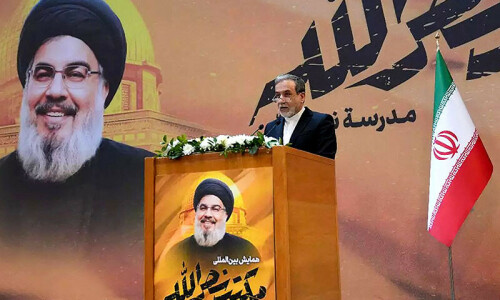Major (rtd) Adil Farooq Raja and Captain (rtd) Haider Raza Mehdi, both former army officers with large following on YouTube, were handed 14 and 12 years of jail sentence respectively following their Field General Court Martial for “inciting sedition”, the military’s media wing said on Saturday.
In a statement, the Inter-Service Public Relations (ISPR) said both retired officers were convicted and sentenced “under the Pakistan Army Act, 1952 for the charges of inciting sedition among army personnel from discharge of duties and violation of the provisions of Official Secrets Act, 1923 related to espionage and acts prejudicial to the safety and interest of the state”.
The ISPR said that Major (rtd) Raja was sentenced to “14 years rigorous punishment” while Captain (rtd) Mehdi was handed “12 years rigorous punishment”.
“The court of competent jurisdiction convicted and adjudged both the individuals on the date of Oct 7 and Oct 9, 2023, through due judicial process,” the military said.
“Pursuant to the awarded sentence, the ranks of both officers have been forfeited on Nov 21, 2023,” the statement said.
Neither Raja, nor Mehdi is likely to serve the sentence as they are based outside of Pakistan.
The convictions likely pertain to the May 9 incidents, when PTI Chairman Imran Khan’s arrest resulted in widespread violence and saw important military installations come under attack.
In June this year, Islamabad’s Ramna Police Station had booked four people, including Raja and Mehdi, for allegedly inciting a mob during the May 9 violent protests.
Days later, Khyber Pakhtunkhwa caretaker minister for information Feroze Jamal Shah Kakakhel had said 33 cases about the riots had been sent to military courts. He had alleged that Raja was “involved in anti-state activities”.
The charges included Pakistan Penal Code’s sections 120-B (punishment of criminal conspiracy), 121 (waging or attempting to wage war or abetting waging of war against Pakistan), 121-A (conspiracy to commit offences punishable by section 121) and 131 (abetting mutiny, or attempting to seduce a soldier, sailor or airman from his duty), along with sections 7 (punishment for acts of terrorism), 11-W (printing, publishing, or disseminating any material to incite hatred) and 21-I (aid and abetment) of the Anti-Terrorism Act, 1997.
Amnesty International and Reporters Without Borders had raised concerns over the cases filed under sedition laws, which it said were used to “silence commentators and journalists”.












































Dear visitor, the comments section is undergoing an overhaul and will return soon.